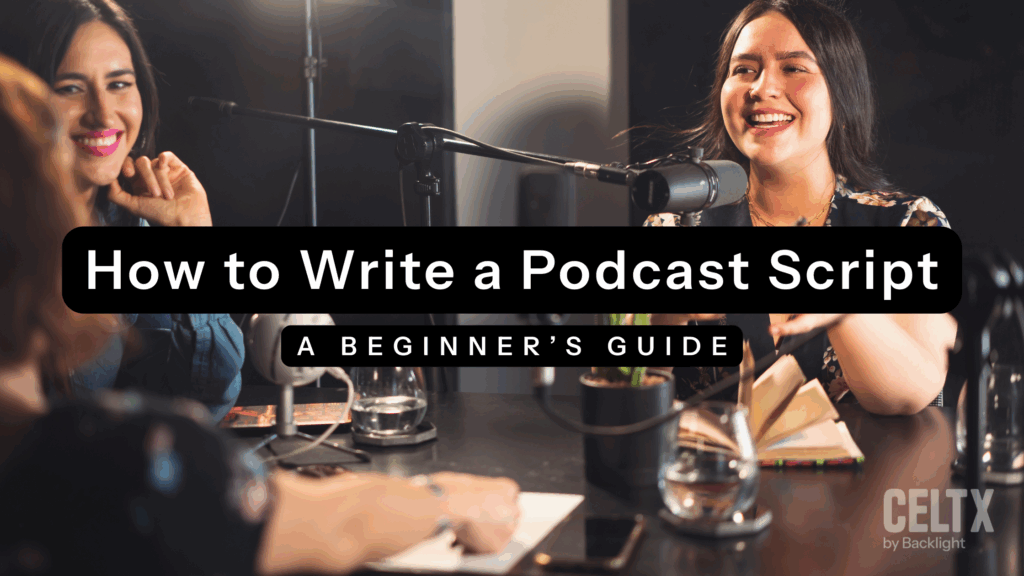
Unless you’ve been living under a rock, podcasting has exploded over the last decade, creating a new and exciting platform for storytelling, education, and entertainment.From lifestyle to true crime documentaries and comedy, we all have a favorite podcast. Our constant companions as we go about our days.

We wouldn’t blame you if you’d thought about starting a podcast. They’re relatively easy to produce and can be done in the comfort of your own home. But where do you start in terms of the content?
While some podcasters prefer to ad-lib their episodes, if you’re a beginner, it can be helpful to have a clear and thoughtful script to refer to. Not only can this elevate the content you’re discussing but will help you stay organized and connect more effectively with your listeners.
That’s where we come in! Welcome to Celtx’s brand new and shiny guide on how to write a podcast script. We’ll explore why scripting your podcast matters, the different podcast formats, what elements you can include, and how to create a compelling and conversational episode from start to finish.
So, let’s get started!
In This Article
- Why Script Your Podcast?
- Types of Podcast Formats
- What Goes Into a Podcast Script?
- Sample Podcast Script Template
- Top Tips for Writing Conversationally
- Tools to Help You Script Your Podcast
- Conclusion
Why Script Your Podcast?
Yes, podcasts are usually fueled by spontaneity which brings a unique flair and personality. However, scripting does also offer several important advantages.
1. Clarity and Structure
A script ensures your podcast episode has a clear beginning, middle, and end. With a simple but proven structure like this, you can keep your content focused and easy for listeners to follow.
2. Time Management
You’re much less likely to ramble or veer off-topic if you have a script to hand to guide you. An episode that goes on for longer than it needs to be or goes off on a tangent can become dull for listeners. Plus, it keeps editing time down to a minimum.
3. Professionalism
Even a loosely scripted episode sounds more polished and deliberate. It doesn’t matter if you’re talking casually about a topic, the time and effort you’ve put into scripting shows your audience that you value their time and attention.

4. Consistency
Having a clear template for your podcast episodes can make it easier to produce content on a regular basis. Most of us are holding down full-time jobs and other responsibilities so this can make everything a lot easier.
5. Confidence
Especially for beginners, a script can be a powerful confidence booster. If you have a clear grasp on what you want to say during an episode, you can minimize nerves and mistakes, making you feel more at ease.
Ready to shape your podcast?
Use Celtx’s script writing software to organize your episodes and stay on pace.
Click here to get started
Types of Podcast Formats
It’s not quite time to dive into your script. First, it’s crucial you understand what format you want your podcast to take. Here are a few different approaches to choose from:
Interview Podcasts
This format does what it says on the tin and features a host interviewing various guests. If you’re looking to create a script template for interview-based podcasts, you’ll need:
- Guest introduction
- Prepared questions
- Transition phrases to take you from one section to the next
- Summary and outro
Interview podcasts by their very nature will include some spontaneity as you won’t necessarily know what your guest’s answers to your questions will be. Don’t script every word. Instead, create bullet points to guide the conversation while leaving room for ad-libbing.

Solo and Monologue Podcasts
Here a single host speaks directly to the audience. If you’re looking to produce a podcast like this, a complete script or even a detailed outline can be helpful to avoid long pauses or filler words.
If you go down this route, practice reading your script aloud to make sure your delivery sounds natural and not like you’re just reciting.
Narrative and Storytelling Podcasts
Along the same vein as audio dramas, these are highly produced, scripted shows which often involve multiple voices, sound design and careful editing.
This style of podcast requires precise attention to detail in terms of pacing, tone and cliffhangers to keep audiences engaged, so bear this in mind!
Panel Shows
Panel shows will have multiple hosts and guests who discuss a topic. Here you’ll need to consider creating a show outline, key questions or segments you want to cover, as well as an intro and outro for each panellist. Remember, you won’t have any visuals to assist you, so this is crucial!
Within your script, we also recommend assigning each part to an individual host for discussion to avoid confusion and reduce people talking over each other.
What Goes into a Podcast Script?
Once you have a clear vision for the format you want to adopt for your podcast, it’s time to start structuring. Remember you want to maintain flow throughout and keep your listeners interested.
Here are the essential elements to consider:
1. Introduction
The introduction is where you hook the audience and entice them into listening on. This section should include:
- A short welcome
- The name of your podcast and the episode title
- What you’ll cover during the episode
- A compelling teaser or quote
2. Sponsor or Call to Action (CTA)
This is an optional step but if you have sponsors or want to promote something such as your email list or merchandise, this is a great time to do this.

3. Segment Introductions and Transitions
As you move into the first main segment and any following segments of your podcast, you’ll want to clearly transition. Musical cues can work great for this, or a few key phrases can clearly indicate when you’re ready to move on. Just like:
- Up next…
- Now we’ve covered X, let’s move onto Y…
- And on that note…
4. Main Content
The core of your episode. Here you’ll want to break your content down into manageable sections or bullet points to cover. Make sure to note down the following:
- Key facts, stories, or points
- Quotes or research
- Anecdotes or examples
5. Guest Questions
If your podcast will feature guests, compile five to eight questions in addition to the main content and follow-ups to keep the conversation flowing naturally if you find the discussion is moving quicker than you anticipated.

6. Outro
Congratulations! You’ve near-completed your first podcast episode. Now it’s time to wrap things up professionally. Don’t let the energy drop as you cover:
- Key takeaways from the episode
- Thanking listeners and guests
- Sharing where to follow, subscribe, and review.
- Tease the next episode if needed.
7. Post-Credits
Another optional step, here is where you could add in a stinger or a behind the scenes moment. Of course, this completely depends on personal preference and whether it’d fit in the theme of your podcast.
Want to plan your beats before you hit record?
Celtx makes outlining your podcast script simple and shareable.
Get started now
Sample Podcast Script Template
It wouldn’t be a Celtx blog without a template to get you started. Here’s a simple, yet flexible template you can adapt for any podcast format, using all the elements we talked about earlier.
[Intro Music]
Host: Welcome to [podcast name], the show where [tagline/mission]. I’m your host, [name], and today we’re talking about [episode topic]. Whether you’re [target audience], you’re in the right place.
Today’s episode is all about [main points or questions]. But first a quick word from our sponsor.
[Sponsor message or call to action]
[Segment 1]
Host: Let’s start by exploring…
[Segment 2]
Host: Moving on to…
[Guest Segment]
Host: Joining us today is [guest name and biography] Welcome to the show! [Include prepared questions and follow-ups]
[Outro]
Host: Thank you so much for tuning in to [podcast name]. If you enjoyed today’s episode, be sure to subscribe, leave a review, and share it with a friend. See you next time!
[Outro music]
[Post credits – if needed]
Top Tips for Writing Conversationally
You may be scripting your podcast; however, it still should sound like a natural conversation. Here are some top tips to achieve just that:
Read it Aloud
Before you record your podcast, read your script aloud or practice using your outline to guide you. If it sounds awkward, don’t be afraid to rephrase it.
Use Contractions
Instead of saying ‘you are’, say ‘you’re’ and ‘we’re’ instead of ‘we have’ to keep things casual. It’s a simple change but can make all the difference.
Use Short Sentences
Long, complex sentences are much harder to say and for listeners to follow along. Keeping sentences shorter makes things easier for everyone involved.
Add Your Own Personality
When all is said and done, your listeners will consume your podcast for your personality! Include side comments, humor, and your own personal flair to make your podcast stand out from the others.

Avoid Over-Scripting
Okay, it sounds like we’re going against everything we’ve said, but your podcast script should only be a guide, especially if you’re including interviews. Make sure to use bullet points or keywords to maintain the flow of the podcast.
Use Sound Cues
Sound effects and music are your best friends and can add extra flair to your podcast. Indicate where music or sound effects should go within your script to help with pacing.
Mark Emphasis
Use bold, capitals, or highlights to indicate key words or emotions that you want to emphasize during your podcasts.
Eventually, as you write more scripts, you’ll find your rhythm and own style. Keep at it!
Tools to Help You Script Your Podcast
Writing and organizing your podcast script can become a breeze with the right tools. Here are some popular options we recommend you explore.
1. Celtx
Our top pick for podcast scripts, of course, is Celtx! Yes, we may be well-known for our screenwriting and production tools, however, we’re quickly becoming a favorite among podcasters for our script formatting and collaboration features.
Our software is fantastic for:
- Narrative podcasts
- Being cloud-based and team-friendly
- Adding sound cues and podcast directions.
Why not try Celtx out for free here?
2. Google Docs
A simple word processor is sometimes all you need. Google Docs is accessible to all and is handy for collaboration. You can also share work with co-hosts or producers.
3. Trello or Notion
Built as organizational tools, Trello and Notion are perfect for any type-A podcasters out there. Their features can help you organize episode outlines, segments, and scripting in a visual format.
Both these offerings have free and paid plans to choose from, so it’s easy to try them out at no risk.

4. Descript
Ideal for transcription and editing, Descript allows you to draft, record and edit your podcast episodes all in one place.
There are three tiers of monthly plans to choose from:
- Hobbyist ($16 per person per month)
- Creator ($24 per person per month)
- Business ($50 per person per month)
5. Scrivener
If you’re looking to develop a more complex podcast series or storytelling formats, then Scrivener could just become your go-to. You do have to pay a one-time fee to use the software with regular upgrades along the way.
6. Podcraft Academy
This is a fantastic one-stop shop for all your podcasting needs, focusing not only on writing podcast scripts, but on how you can reach your ideal audience and make a profit.
Check them out here.
Conclusion
Scripting your podcast may take a little extra time upfront, but it pays off in clarity, professionalism, and listener engagement. Whether you’re narrating a story, interviewing a guest, or delivering insights solo, a script helps you stay focused, sound polished, and deliver consistent value to your audience.
Start simple. Use a basic template and adapt it as your style evolves. Remember, the best podcasts feel authentic, and a good script is a tool to help you get there, not a constraint. So, grab your mic, open your notes, and start scripting your next great episode.
Happy podcasting!
Whether you’re crafting true crime, comedy, or narrative fiction,
Celtx gives you the tools to script smarter.
Start your free trial today.
Learn more about script structures:
- AV Script: What It Is & How to Use One [For Screenwriters]
- How to Write a Play: A Beginner’s Guide to Playwriting
- How to Format a Script | A Step-by-Step Guide
